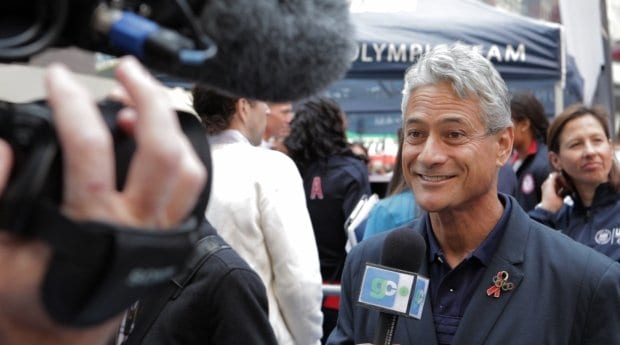Pioneering out Olympians are being honoured April 23 for their contributions to LGBT inclusion in sports.
The Bonham Centre and the Canadian Olympic Committee host this year’s Bonham Centre Awards Gala and Summit, with partners You Can Play and Egale. Established in 2007, the awards recognize individuals or groups that have made a difference in the field of sexual diversity education. Mark Tewksbury, Greg Louganis and Marnie McBean will be recognized as people who have made a difference in the world of sports.
“These are people that were coming up through sport at a time when there was no safe space at all,” says Brenda Cossman, director of the Bonham Centre.
Mark Tewksbury, who won Olympic gold in the 100 metres backstroke in 1992 for Canada, says that was the case for him. “There wasn’t really space to talk about it with anybody.”
Times have changed.
“There’s been a massive shift in sport,” he says. “It’s not a non-issue, but the issue has advanced.”
Cossman agrees, but calls it a “work-in-progress” that needs addressing — all the way up from organizing bodies and down to the locker rooms.
The theme for this year’s gala and summit, was two years in the making.
“Sports just seemed obvious for this year,” Cossman says. She points out that 2015 is the year of sport in Canada, with the FIFA Women’s World Cup happening across the nation, and the Pan Am and Parapan Am Games coming to Toronto.
And while planning was underway before the Sochi Olympics, those games certainly had an impact on the decision to focus on sports. Russia’s anti-gay-propaganda law and the stress it put on LGBT athletes naturally led to the question, “What can be done post-Sochi?”
“This is a very important time to ask what does sexual diversity inclusion look like in sport?” Cossman says. The summit looks to tackle the question. “We had an opportunity to say, ‘Let’s not just honour these athletes — let’s have this more substantial conversation.’”
The summit covers several components. Attendees will hear from athletes about “where they came from, where they are now and where they think things are going to go.” They’ll also hear from organizations, about what training materials are being developed; from academics, about what they think could bring about institutional change; and from the corporate world, about how to change an institution and its workplace culture. The summit also covers what kind of political direction leaders must take, nationally and internationally, on this issue. Additionally, the local level is broached with the 519 Church Street Community Centre, explaining why its proposed LGBT sports and recreation centre is needed.
“Thinking about safe space and how we get there — there’s a lot of pieces to that,” Cossman says.
“[The awards have] been a really great catalyst for some important discussion,” Tewksbury says.
For 15 years, he has spoken on the issue widely and has mentored other LGBT athletes. But Tewksbury now feels there are so many mentors out there that he can pass on the baton. “Pretty soon, I won’t be the only guy anymore, but for a long time I was.”
He attributes the strides made to athletes coming out and the organizations and individuals that have helped along the way.
So as he hangs up his Speedo, how would he define success?
“At my age, success would be defined as the next generation of athletes feeling safe,” he says.
Editor’s note: This story has been corrected. An earlier version misspelled Olympian Marnie McBean’s name as Marine McBean.


 Why you can trust Xtra
Why you can trust Xtra


